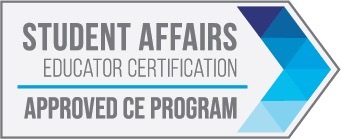
Assessment and Evaluation Bundle
- Registration Closed
Based on the Assessment and Evaluation Student Affairs Educator Certification domain, this package includes 11 webinars that appraise the quality and effectiveness of higher education work with an understanding and appreciation for different contexts, cultures, and backgrounds.
Webinars Include: Institutional Research and Student Affairs: Powerful Partners in Student Satisfaction, Leverage: Using Data & Legal Analysis to Change Policies Regarding Gender Identity & Trans Students, Markers and Making Change: Using Design Thinking to Impact Campus Culture and Community, Assessment, Communication, and Fundraising: Storytelling, Collaboration, and Success, Assessment Tool Box: Four Practical Tools to Help you Assess Student Leadership, ChatGPT is Coming for Us All! (Or not.): The Ethics and Effective Use of Artificial Intelligence in Education, Assessment versus Research. What is the Difference? Why Does It Matter?, Knowing Our Students
Webinar Package Pricing:
Members: $99
Non-members $299
-
Contains 1 Component(s)
This program describes how professionals in student affairs and institutional research can utilize the Ruffalo Noel Levitz Student Satisfaction Inventory (SSI) for data-driven decision making. Using a 5-point systematic assessment model, the presenters provide an example of a retention strategy that resulted in improved practice and increased student satisfaction at Emmanuel College in Boston.
This program describes how professionals in student affairs and institutional research can utilize the Ruffalo Noel Levitz Student Satisfaction Inventory (SSI) for data-driven decision making. Using a 5-point systematic assessment model, the presenters provide an example of a retention strategy that resulted in improved practice and increased student satisfaction at Emmanuel College in Boston.
-
Contains 1 Component(s)
This program provides definition, data and policy information, and research on gender identity and trans students.
This program provides definition, data and policy information, and research on gender identity and trans students.
-
Contains 2 Component(s)
This session demonstrates how human-centered design and design thinking can be used as a tool for creating institutional culture change. Participants will learn how to assess the needs of a user including students, faculty, or staff, and apply a creative and iterative design process to find solutions that lead to change. Presenters outline how the Swarthmore College Center for Innovation and Leadership has used design thinking and how the audience can also make large scale change.
This session demonstrates how human-centered design and design thinking can be used as a tool for creating institutional culture change. Participants will learn how to assess the needs of a user including students, faculty, or staff, and apply a creative and iterative design process to find solutions that lead to change. Presenters outline how the Swarthmore College Center for Innovation and Leadership has used design thinking and how the audience can also make large scale change.
-
Contains 5 Component(s), Includes Credits
Assess, assess, assess! There are many competing priorities and projects that require teams to articulate what needs to be assessed, how they are assessing and why they are assessing. An assessment calendar captures these different factors to ensure your team is on track and focused on aligning assessment projects to the departmental and divisional needs. Learn the key ingredients to construct a successful assessment calendar and practice creating an assessment calendar in this session!
Assess, assess, assess! There are many competing priorities and projects that require teams to articulate what needs to be assessed, how they are assessing and why they are assessing. An assessment calendar captures these different factors to ensure your team is on track and focused on aligning assessment projects to the departmental and divisional needs. Learn the key ingredients to construct a successful assessment calendar and practice creating an assessment calendar in this session!

Janae’ Collier
Associate Director
University of Michigan
Dr. J' currently serves as the Associate Director of the Michigan Research & Discovery Scholars program at the University of Michigan. Dr. J's earned her Ph.D. from the University of Cincinnati in Health Education, specializing in counseling and wellness in higher education and is a and is a Certified Dave Ramsey Financial Master Coach. Dr. J' lead at Syracuse University as the Coordinator of Academic Initiatives & Assessment from 2019-2021. Beyond her contribution to higher education, Dr. J' manages her financial coaching business where she coaches individuals on defining and creating their financial peace & health in their personal life. Dr .J's life mantra is "Accept Help. Give Hope. Welcome Happiness" .
Continuing Education Credits
Participants who complete the course will be eligible for Continuing Education (CE) credits in either the Core Student Affairs Educator Certification (CSAEd™)
NASPA has been approved by the Higher Education Consortium for Student Affairs Certification to provide CE credit for Certified Student Affairs Educators (CSAEd). NASPA is solely responsible for all aspects of this program.
Guidelines for earning CE credit:
1 CE is awarded for attending this live session.
No partial credit will be rewarded.
Participants must also complete the feedback survey in the Online Learning Community.
Credit is available for attending the live session and viewing the on-demand recording.
To receive CSAEd credit, attendees must complete the Feedback Survey in the online event offering the certification. Once the survey is completed, your Certificate will be available in the event modules. The Certificate of Completion, which will show the event and credit earnings, is available for download and/or print from the event in your Online Learning Community.

-
Contains 2 Component(s)
Looking for ways to improve your division’s assessment work? In this program, student affairs leaders in residential education join analytics and research staff from Skyfactor to explore tangible ideas and resources to employ within your organization.
Looking for ways to improve your division’s assessment work? In this program, student affairs leaders in residential education join analytics and research staff from Skyfactor to explore tangible ideas and resources to employ within your organization.
-
Contains 1 Component(s)
With the rapid evolution of artificial intelligence (AI) writing programs, such as ChatGPT, educators, students, and administrators face both opportunities and challenges. While these tools offer enhanced writing capabilities and learning experiences, they also pose potential risks when misused. This presentation will offer a comprehensive look into the capabilities of AI writing tools, their projected trajectory in education, and recommendations for drafting rules and policies to regulate their use effectively.
- Introduction to ChatGPT and Similar Tools: A walkthrough of the prominent features and capabilities of ChatGPT and its counterparts. This will give attendees a firsthand understanding of what the technology can and cannot do.
- Ethical Implications: Discussion on potential misuse, such as plagiarizing, paper generation, and other academic integrity violations. An exploration of the blurred lines between AI-assisted learning and AI-dependent learning will be highlighted.
- Discussion with attendees: Outlining strategies that can be employed by educators and institutions to: Educate students about ethical AI usage; implement policy changes that account for the use and misuse of AI writing aids; modify assessment methods to ensure genuine student understanding and reduce over-reliance on AI.
Learning Outcomes:
1. Educators and administrators will gain an in-depth understanding of AI tools, learning their capabilities and limitations in the context of modern education.
2. The presentation will highlight the ethical challenges and potential academic integrity issues posed by AI in education, emphasizing the importance of responsible usage.
3. Attendees will leave with practical strategies and policies to effectively integrate AI into educational settings, ensuring it enhances learning without compromising academic integrity.

Christian Moriarty
Professor of Ethics and Law; Executive Board Member and Treasurer
St. Petersburg College; International Center for Academic Integrity
Christian Moriarty is a Professor of Ethics and Law with the Applied Ethics Institute at St. Petersburg College, a public community college in St. Petersburg, Florida. Professor Moriarty received his Bachelor’s degree in Psychology and Interdisciplinary Sciences at the University of South Florida, his Master’s degree in Bioethics from USF, his Juris Doctor from Stetson University College of Law, and is a licensed attorney with the Florida Bar. He teaches Applied Ethics, Medical Ethics, Business Ethics, Legal Ethics, Business Law, and Art Law. He researches and presents on such subjects as academic integrity, emerging technology ethics, using humor and empathy in the classroom, and higher education law and ethics. Professor Moriarty serves on the Executive Board and is Treasurer of the International Center for Academic Integrity.
-
Contains 2 Component(s)
Open this assessment toolbox and learn to identify different strategies to assess student leadership as well as articulate their value at your institution.
Open this assessment toolbox and learn to identify different strategies to assess student leadership as well as articulate their value at your institution.
-
Contains 4 Component(s)
We have learned students are not one-dimensional. There is no longer a singular definition of a "typical" student, with the enrollment of diverse student populations steadily increasing. Student identities have evolved beyond the previously perceived "traditional" norms. The guidebook titled "Knowing Our Students: Understanding & Designing for Success" offers valuable resources for colleges to identify and comprehend the unique characteristics of their student body.
We have learned students are not one-dimensional. There is no longer a singular definition of a "typical" student, with the enrollment of diverse student populations steadily increasing. Student identities have evolved beyond the previously perceived "traditional" norms. The guidebook titled "Knowing Our Students: Understanding & Designing for Success" offers valuable resources for colleges to identify and comprehend the unique characteristics of their student body. Originally published in 2021, the updated edition of the guidebook, released in 2023 by Achieving the Dream and Advising Success Network, serves as an essential tool for institutional leaders and student success teams. It encourages a fresh dialogue about the student population and provides practical strategies derived from national experts and peer institutions. The guidebook imparts the latest knowledge, real-world examples, and effective tools on:
Gaining a profound understanding of students
Identifying relevant and useful data points
Employing data effectively to enhance student success
Anticipating and addressing potential challenges
Implementing strategies to overcome these challenges
Learning Outcomes:
- Understand the Knowing Our Student Guide Concepts
- Articulate the Importance of the Student Journey
- Understand the importance of the Student Voice.
- Outline the Student Experience

Paula Pitcher
Director, Holistic Student Supports
Achieving the Dream

Paula Tailey
Executive Director, Program Development
Achieving the Dream
Continuing Education Credits
This session counts for 1.0 CSAEd-CORE credit
NASPA has been approved by the Higher Education Consortium for Student Affairs Certification to provide CE credit for Certified Student Affairs Educators (CSAEd). NASPA is solely responsible for all aspects of this program.
Guidelines for earning CE credit:
No partial credit will be rewarded.
Credit is available for attending the live session or viewing the on-demand recording, not both.
To receive CSAEd credit, attendees must complete the feedback survey that offers the certification in each session. Once you have attended all the live sessions or watched the on-demand sessions for which you would like to request credit, visit the Continued Education (CE) website to fill out the Student Affairs Education Certification Request Form for all the sessions. All certificants must fill out one for the live session and a separate one for the on-demand sessions.
Visit the Continued Education (CE) website to learn more regarding deadlines and receive your certificate of completion for the Virtual Conference.
-
Contains 1 Component(s)
This program is sponsored by the NASPA Assessment, Evaluation, and Research Knowledge Community. It includes foundational knowledge about the concepts of assessment and research, as well as approaches to assessment and research based on definitions and philosophy. Participants of the program will learn to apply assessment and research processes to student affairs practice and articulate the need for assessment and research skill development.
This program is sponsored by the NASPA Assessment, Evaluation, and Research Knowledge Community. It includes foundational knowledge about the concepts of assessment and research, as well as approaches to assessment and research based on definitions and philosophy. Participants of the program will learn to apply assessment and research processes to student affairs practice and articulate the need for assessment and research skill development.





